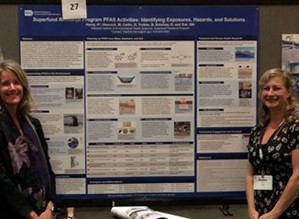Science Leadership

Superfund Research Program (SRP) staff and grantees are committed to advancing research by presenting innovative findings, tools, and technologies to stakeholders in academia, government, and local communities.
The SRP Annual Meeting, held November 18 - 20 in Seattle, brought together SRP researchers, trainees, administrators, and partners to share findings and discuss research translation, community engagement, and training. The meeting centered on "Data to Knowledge to Action" and emphasized how fundamental research has stimulated knowledge translation, training, and prevention and intervention activities. Presenters discussed novel techniques to evaluate the effects of hazardous substances, new exposure science and detection technologies, and remediation strategies. The meeting also emphasized the importance of engaging with local communities and included perspectives from members of the Duwamish River Cleanup Coalition ,a University of Washington SRP Center community partner.

NIEHS staff and grantees shared their expertise and discussed ways to address pressing environmental health issues at the Pacific Basin Consortium (PBC) conference ,September 15 - 19 in Kyoto, Japan. The conference was partly sponsored by the SRP. The meeting centered on solutions to reduce early-life exposures to contaminants in the Pacific Basin region and around the world. In a plenary session focused on pollution and health, SRP Director William Suk, Ph.D., emphasized the importance of scientific leadership initiatives to lay out priorities and expand the role of prevention and intervention activities. SRP Health Scientist Administrator Michelle Heacock, Ph.D., presented and chaired a symposium focused on data sharing, integrating, and modeling for environmental health information and decision making. SRP Health Specialist Brittany Trottier co-chaired a student presentation session, where trainees presented their research, answered questions, and received feedback from faculty.
Students supported by the SRP took part in the 2019 International Phytotechnologies Conference, September 23 - 27 in Changsha, China. Phytotechnologies refer to plant-based methods to clean water, soil, and air and to provide ecosystem services, including energy production from biomass. First initiated for the 2009 conference, the SRP-fundedPhytoscholars grant programprovides resources for U.S.-based graduate students and postdoctoral associates to attend and participate at the international meeting. Phytoscholars presented posters on their research, learned more about current research advances in the field of phytotechnologies, and met with scientists and engineers from all over the world.
Heather Henry, Ph.D., was involved in two events in North Carolina, the 2019 Triangle Global Health Annual Conference on October 16 and the Research Triangle Environmental Health Collaborative 2019 Summit ,held October 23 - 24. At the latter, Henry presented on potential solutions for per- and polyfluoroalkyl substance (PFAS) contamination and described ongoing SRP-funded PFAS remediation research.

SRP grantees gathered August 12 - 15 to discuss per- and polyfluoroalkyl substances (PFAS) at the Society of Environmental Toxicology and Chemistry's North America Focused Topic Meeting in Durham, North Carolina. Several SRP trainees presented posters on their research, including Anna Robuck and Jitka Becanova, Ph.D., of the University of Rhode Island's Sources, Transport, Exposure, and Effects of PFAS (STEEP) SRP Center. SRP Health Scientist Administrators Heacock and Henry also promoted new tools and technologies the program's researchers are developing to characterize PFAS in the environment and to remove PFAS from water, soil, and sediment.
The SRP awarded administrative supplements to its Multiproject Center and Individual Research grantees to expand data integration, interoperability, and reuse. The supplements aim to tackle one of the biggest challenges in SRP data sharing: how to integrate and reuse data across biomedical and environmental science and engineering fields. The supplements will also help each Center improve data management by making previously and newly produced datasets more accessible, interoperable, and reusable to SRP researchers.
to Top



